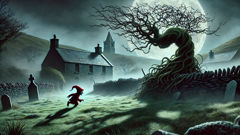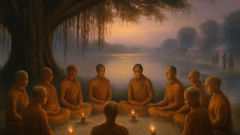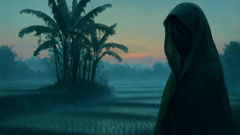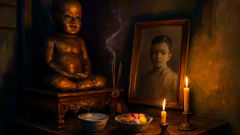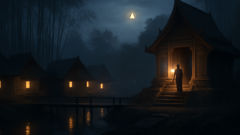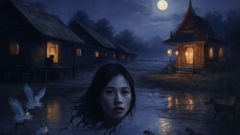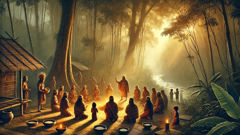Introduction
There are corners of Ireland where the green seems deeper, the mist heavier, and the stories older than the oldest stones. In County Sligo, nestled between bracken-clad hills and rain-damp peat bogs, the little village of Drumcliff sits quietly. Its narrow lanes twist through fields studded with hawthorn trees, their gnarled branches said to guard the secrets of the Otherworld. The people of Drumcliff have always held a wary respect for what walks between the veils: the Good Folk, the solitary fairies, and the red-capped Far Darrig—the Red Joker. They say if you hear laughter in the dark, or find your milk sour and your dreams unsettled, you might’ve caught the Far Darrig’s attention. He isn’t like the cheerful leprechaun or the graceful sidhe. He walks alone, a short, stocky figure in tattered scarlet, his face a mask of delight or malice depending on his mood. Some claim he’s just a jester, playing harmless tricks. Others whisper darker tales—of children lured by his singing, of cattle gone mad, of laughter turning to screams. Yet for all his mischief, the Far Darrig is drawn to the boundary between mirth and misery, and the villagers know: to outwit him takes both courage and kindness. On a spring night when the moon was thin as a sickle, a story began that would change Drumcliff forever. It started, as many such stories do, with a daring heart and an ill-advised wish. It would end with a reckoning between laughter and sorrow, and the true meaning of courage in the shadow of the Red Joker.
Chapter One: Laughter in the Dark
In the heart of Drumcliff, life moved by the slow rhythm of seasons and the steady beat of tradition. The air always carried the tang of peat smoke and the distant echo of stories passed down over generations. No one doubted that the unseen world pressed close here; the villagers salted their doorsteps, tied rags to the fairy trees for luck, and never—never—crossed the old bog after sundown. Most especially, they avoided the lonesome path skirting the edge of Benbulben hill, where the brambles grew thick and the winds seemed to carry voices not quite human.
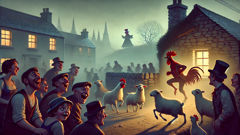
On a night heavy with rain and the promise of spring, Niamh O’Connell hurried home from her grandmother’s cottage, her arms full of warm bread and herbs. Niamh was a weaver’s daughter, tall and bright-eyed, with a stubborn chin and laughter that could charm the birds from their nests. She’d always been quick to smile, yet she harbored a quiet restlessness—a longing for something beyond spinning wool and tending sheep.
As she neared the hawthorn tree at the village edge, she heard it: laughter, wild and shrill, slicing through the drizzle. Niamh’s steps faltered. The stories her grandmother told whispered through her mind—never answer a voice in the dark, never mock the laughter of the Good Folk. But curiosity tugged at her, and she edged closer to the tree, heart thudding.
There he stood: a squat figure, no taller than her shoulder, dressed in rags of deepest red. His hair was wiry and matted, his beard tangled as brambles, his eyes glittering like wet slate. The Far Darrig grinned, revealing teeth sharp as a fox’s. He bowed low, his red cap nearly brushing the grass. “Will you play with me, girl?” he crooned, voice rich as bogwater. “It’s a cold night for walking alone.”
Niamh swallowed her fear. “I’ve no time for games. My mother’s waiting.”
“Ah, but you’re not frightened, are you? Not like the others.” His gaze darted to the bread in her arms. “Share your supper and I’ll show you a joke the likes of which Drumcliff’s never seen.”
She hesitated. It was said that refusing a fairy’s request could bring misfortune, yet accepting could be worse. Heart pounding, she broke a piece of bread and held it out.
He snatched it with a cackle and spun it between his fingers. “Thank you, Niamh O’Connell. You’ve a kind heart, but don’t let it blind you.” With a wink, he vanished into mist, leaving only a scrap of red wool snagged on the hawthorn.
The next morning, Drumcliff awoke to chaos. Chickens squawked with human voices, sheep danced jigs on two legs, and every mirror in the village showed not faces but grinning red-capped sprites. The villagers blamed each other, then the weather, but soon the truth crept in: the Far Darrig had chosen Drumcliff for his sport.
The pranks continued—salt replaced with sugar, babies’ hair dyed crimson in their sleep, cows found stacked atop thatched roofs. For some, it was harmless fun, but for others, laughter soured into fear. Old Tomás lost his way home, wandering in circles until dawn. Siobhán’s best china shattered into blood-red petals. People whispered that the Far Darrig’s jokes could turn cruel, and that each trick left the air colder, the nights longer.
Niamh watched the village unravel. She felt a prick of guilt, remembering the bread she’d shared, the way the fairy had spoken her name. At dusk, she visited her grandmother. The old woman’s cottage was filled with the scent of thyme and the warmth of a peat fire.
“Child,” her grandmother murmured, pressing a talisman into Niamh’s palm, “the Far Darrig feeds on folly and fear. He’ll not leave while there’s mischief to be made. But remember—his magic is old, and even laughter can wound.”
That night, as Niamh lay awake, the wind carried another burst of laughter—this time tinged with something darker. She understood then that Drumcliff faced not just pranks, but a test of spirit. If they surrendered to fear or anger, they’d be lost. But if someone found the courage to face the Red Joker, perhaps the balance could be restored.
Chapter Two: Shadows at the Edge of the Light
Days passed, and Drumcliff’s mood darkened. The Far Darrig’s tricks grew more elaborate, his laughter more pervasive. Doors slammed shut on their own, leaving villagers locked inside their homes. Milk churned itself into bloody foam. Even the church bell tolled at midnight, echoing across the hills as if warning of unseen doom. Some said they glimpsed flashes of red darting through the hedgerows, while others claimed their dreams were invaded by shadowy figures dancing in endless circles.
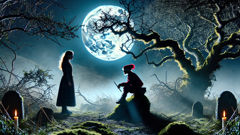
Niamh felt the village’s tension mounting. Children cried at night; their parents grew short-tempered and suspicious. She tried to keep her courage, clutching her grandmother’s talisman. But one evening, her younger brother, Eoin, vanished while fetching water from the well. He returned hours later, shivering, his lips stained crimson. He spoke only in riddles, unable to explain what he’d seen. Niamh’s heart ached with fear.
Desperate, Niamh sought out Father O’Shea, the parish priest. His face was haggard, eyes ringed with sleeplessness. “The Far Darrig’s no simple prankster,” he muttered. “He’s drawn by sorrow and feeds on it. I’ve prayed and blessed every house, but his mischief only deepens.”
That night, Niamh resolved to confront the Red Joker herself. She followed the path to the hawthorn tree, moonlight glinting on dew. The wind was heavy with the scent of wild garlic and damp earth. When she arrived, the Far Darrig was waiting, sitting cross-legged atop a mossy stone, whittling a flute from elderwood.
He looked up, eyes twinkling. “Back again, are you? Most would’ve fled.”
“I want you to stop. The village is suffering.”
He grinned wider, sharp teeth flashing. “Suffering? Or learning? It’s all laughter until the laughter turns, girl. Why should I leave when the game’s just begun?”
Niamh’s voice trembled. “Because you’re hurting them. And I won’t let you.”
The fairy’s gaze grew cold. “Ah, but what will you give me in return?”
Niamh hesitated, then said softly, “Take my courage, if you must. Leave Drumcliff in peace.”
For a moment, the air thickened, the mist swirling tighter around them. The Far Darrig studied her, the mischief in his eyes flickering with something ancient and sad.
“Very well,” he said at last, “but there’s always a price.” He reached out a gnarled hand, and Niamh felt her heart lurch as if caught in a snare. Suddenly, her fear vanished—not because she was brave, but because she could feel nothing at all. The world dulled, sounds faded. The Far Darrig laughed softly. “Now you’ll see how laughter tastes when you’ve lost your heart.”
The next day, Drumcliff was eerily calm. The pranks stopped; milk flowed sweet and fresh, doors stayed open, and the villagers began to relax. But Niamh walked through it all feeling empty, her laughter gone, her spirit hollow.
Her family noticed the change. Her mother wept; her friends worried. Even Eoin watched her with wide, frightened eyes. Niamh tried to care, but the world seemed grey and distant. It was then that she realized: she hadn’t saved Drumcliff—she’d only traded one curse for another.
Haunted by regret, Niamh returned to her grandmother, who listened in silence. The old woman pressed Niamh’s hands in her own. “The Far Darrig thrives on misery as much as on mirth. You must go beyond fear and bargain for what’s truly yours.”
Determined, Niamh set out once more, this time carrying not bread or talisman, but the memory of her village’s laughter—the echo of children’s games, of music by firelight, of hope. She would face the Red Joker not as a victim, but as an equal.
Conclusion
In the final reckoning, Niamh found the Far Darrig where the boundary between worlds thinned—a circle of mushrooms glowing under moonlight. He greeted her with neither smile nor scowl, but a watchful silence. This time, Niamh spoke not of bargains or threats. She knelt and began to sing a lullaby her mother had sung to her as a child—a melody woven with longing and love. As she sang, the circle glimmered with old magic. The fairy listened, his sharp features softening. He seemed to shrink, his red cloak darkening to russet, his eyes filling with centuries of sorrow and laughter.
When the song ended, Niamh stood tall, her voice steady. “You may take my laughter,” she said, “but you’ll never own my hope.”
The Far Darrig bowed his head. For the first time, he looked tired—less a demon than a creature bound by his own ancient loneliness. With a sigh, he reached out and touched Niamh’s brow. Warmth flooded her, color returning to her world. She felt her courage—and her heart—restored.
The Red Joker vanished with the first rays of dawn. Drumcliff woke to peace at last: no more tricks, no more shadows. Yet in the fields and the laughter of children, a little mischief lingered—a reminder that joy and sorrow are never far apart, and that kindness can outwit even the oldest magic. Niamh’s story became legend: a tale of courage, wit, and the power of hope beneath the ever-watchful eyes of Ireland’s solitary fairy.

